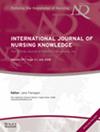Challenges to sustainability of standardized nursing care plan in selected tertiary health institutions in Nigeria
IF 1.4
4区 医学
Q3 NURSING
引用次数: 0
Abstract
PURPOSE The purpose of this study was to assess the challenges to sustainability of standardized nursing care plan in selected tertiary health institutions in Nigeria. METHODS Using convergent mixed method design, the qualitative and quantitative data were collected from 427 nurses and nine stakeholders. This was done in one phase with the use of validated questionnaires and in-depth interview guide/key informant interview guide. Data were collected for 5 months and analyzed with SPSS version 25. Qualitative data were analyzed using themes. RESULTS The explored significant challenges by stakeholders and nurses to sustainability of standardized nursing care plan (SNCP) in all the selected hospitals were inadequate knowledge of standardized nursing languages (SNLs), inadequate staffing, lack of motivation, lack of mandate to use SNLs by the educational system, lack of computers on the wards, weakness of previous training on SNL/SNCP, lack of interest, and high patient load. CONCLUSION The study concludes that inadequate knowledge of SNLs and inadequate staff could contribute to non sustainability of SNCP. IMPLICATIONS FOR NURSING PRACTICE Nurses should be continuously trained on standardized nursing languages. Staff motivation and increasing the number of staff on the wards would increase the interest of the nursing staff. This will in turn improve the quality of documentation and patient care.尼日利亚某些三级保健机构标准化护理计划可持续性面临的挑战
本研究的目的是评估尼日利亚选定的三级卫生机构标准化护理计划的可持续性所面临的挑战。方法采用收敛混合法设计,对427名护士和9名利益相关者进行定性和定量调查。这是在一个阶段内完成的,使用了有效的问卷调查和深度访谈指南/关键信息提供者访谈指南。数据收集5个月,用SPSS 25进行分析。定性数据采用主题分析。结果在所选医院中,利益相关者和护士对标准化护理计划(SNCP)的可持续性面临的主要挑战是:标准化护理语言知识不足、人员配备不足、缺乏动力、教育系统缺乏使用标准化护理语言的授权、病房缺乏计算机、以前对标准化护理语言/SNCP的培训薄弱、缺乏兴趣、对标准化护理计划(SNCP)的管理缺乏兴趣。病人负荷也很高。结论研究认为,对snl的认识不足和人员不足是SNCP不可持续的原因。护士应持续接受标准化护理语言的培训。工作人员的积极性和增加病房的工作人员数量会增加护理人员的兴趣。这将反过来提高文件和病人护理的质量。
本文章由计算机程序翻译,如有差异,请以英文原文为准。
求助全文
约1分钟内获得全文
求助全文
来源期刊
CiteScore
2.90
自引率
14.30%
发文量
47
审稿时长
>12 weeks
期刊介绍:
The International Journal of Nursing Knowledge, the official journal of NANDA International, is a peer-reviewed publication for key professionals committed to discovering, understanding and disseminating nursing knowledge.
The Journal aims to clarify the knowledge base of nursing and improve patient safety by developing and disseminating nursing diagnoses and standardized nursing languages, and promoting their clinical use. It seeks to encourage education in clinical reasoning, diagnosis, and assessment and ensure global consistency in conceptual languages.
The International Journal of Nursing Knowledge is an essential information resource for healthcare professionals concerned with developing nursing knowledge and /or clinical applications of standardized nursing languages in nursing research, education, practice, and policy.
The Journal accepts papers which contribute significantly to international nursing knowledge, including concept analyses, original and applied research, review articles and international and historical perspectives, and welcomes articles discussing clinical challenges and guidelines, education initiatives, and policy initiatives.

 求助内容:
求助内容: 应助结果提醒方式:
应助结果提醒方式:


